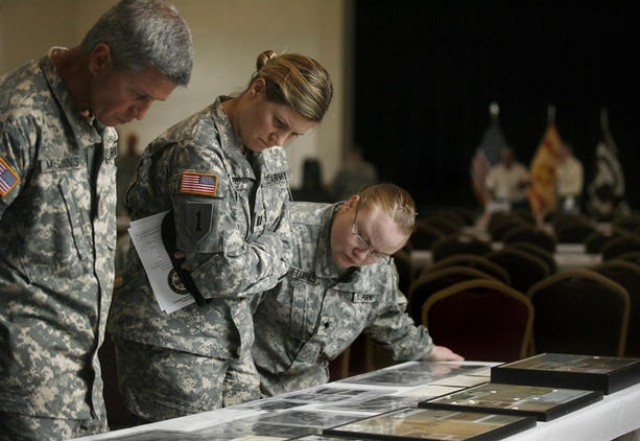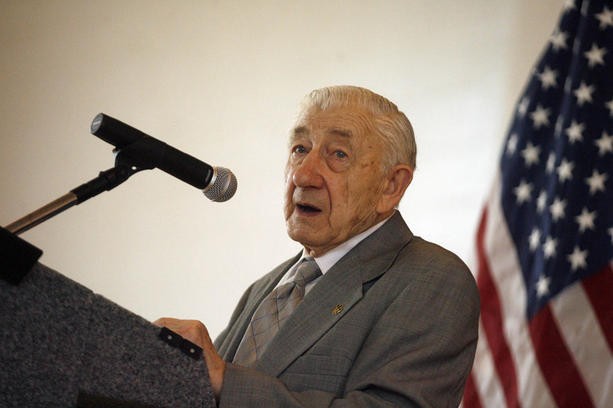FORT GEORGE G. MEADE, Md. (May 5, 2011) -- During the Holocaust, Morris Rosen was forced to spend more than five years moving between German labor camps.
Surviving on little food, he performed hard labor in the snow in threadbare clothing and marched for days in bitter temperatures. By war's end, both his parents and five of his siblings had perished.
Now, more than six decades since he was liberated, Rosen shared his experiences with the Fort Meade community at the Holocaust Days of Remembrance Observance.
Held April 28 at McGill Training Center, the program was hosted by Fort Meade's Warrior Transition Unit and sponsored jointly by the installation command and Equal Opportunity Office.
Rosen, the keynote speaker, spoke on the theme, "Justice and Accountability in the Face of Genocide: What Have We Learned'"
"It's very difficult to condense five years of the darkest chapter in mankind's history into one hour," the 89-year-old survivor said at the program. "Even if I could talk all day, it wouldn't be enough."
One of 10 children, Rosen grew up in Dabrowa Gornicza, an industrial town in western Poland, about 25 minutes from the German border. His father owned a general store in the city, but was forced to close the shop in 1938 after a boycott of Jewish businesses.
A 14-year-old boy.
Rosen was 14 years old when German forces invaded Poland the following year. "About five in the morning, we awoke to airplanes," he said. "When I looked out the window, there were about 60 German planes flying very low over the roofs."
As soon as the German troops moved into his hometown, the Jewish citizenry was governed by Germany's Nuremberg Race Laws. Poland's laws no longer applied. From 6 p.m. to 7 a.m. any Jew caught in the street was immediately shot. Stores owned by Jewish people were confiscated. A Jewish council was formed to impose restrictions on the Jewish populace.
"The Jewish council was responsible for all dirty work that the Germans needed to do," he said.
During the German occupation, Rosen received special identification and worked as a bricklayer and a carpenter for the German construction office. His first job as a carpenter was to help build scaffles for hanging.
"They were punishing. If one German got killed, they took 50 hostages of the city and killed them," he said.
In 1940, some members of Rosen's community were sent to labor camps including his 12-year-old sister, who was taken to a camp to make German uniforms. In 1942, all the Jewish families were ordered to gather to receive new identification. They were told that anyone who did not come would be shot. Only two people in the town didn't show up, Rosen said.
The group was surrounded by German troops and machine guns mounted on rooftops. "They put up three tables and started the selection," Rosen said.
Little food or water.
His parents were taken away and he was left to care for his sister.
After the selection, Rosen worked for about six months in a factory. He was then transferred to another camp, where he worked as a maid.
Rosen was ordered to go to Auschwitz concentration camp, but begged a befriended German to send him where his sister was -- a women's labor camp. Rosen found his sister, but the camp soon became a concentration camp. The men were taken to another camp where Rosen performed hard labor in snow with little or no food -- typically a slice of bread and water.
"I became like skin and bones and I thought I would die for sure because I couldn't breathe in the snow," he said.
The only clothing Rosen was given was pajamas. He slept in one room with about 650 people.
"I was on the third bunk, 12 people in a row to sleep," he recalled. "If somebody wanted to turn, everybody turned like sardines, one against the other."
In February 1945, as the Soviet army approached the camp, Rosen and the remaining prisoners were sent on a death march in the woods with only blankets, bread and marmalade. They marched through the brutal winter for eight hours a day.
10 days of marching.
"There were over 3,000 people," Rosen said. "At least 400 were shot at night -- they couldn't walk."
After 10 days of marching, they reached Dresden and were allowed to bathe in a frigid river. "God gave us a good present of jumping into the water -- wash yourself, kill the lice and kill yourself," he said.
By the end of April, Rosen reached the ghetto of Theresienstadt where the prisoners were given their first food in 11 days.
"Some people had shrunken stomachs and they couldn't even eat," Rosen said.
Rosen was soon liberated by Soviet troops who offered food, drink, money and travel to the freed prisoners. Rosen made his way to the American forces by train.
"They gave me food, they gave me cigarettes," he said. "I don't smoke, but I took it anyway."
Rosen then spent several years in displaced persons' camps in Austria and Germany before immigrating to the United States.
After the hourlong program, audience members sampled food provided by a kosher caterer and studied artifacts from the period.
Although decades have passed since the Holocaust, the stories and lessons of that tragic period are still important, said Col. Peter Masterton of U.S. Army Claims Service, who attended the event.
"If you don't have survivors from the Holocaust tell you what really happened, you're going to forget it," Masterton said. "If you forget it, it's possible to repeat it."
Masterton said Rosen's presentation showed how "horrific the time was."
Staff Sgt. Lakisha Gray of Alpha Company 741st Military Intelligence Battalion compared the Holocaust and Rosen's experience to slavery. She agreed that hearing Rosen's experience as a survivor was more meaningful than just learning about the Holocaust from a book.
At the end of the program, the elderly survivor offered heartfelt advice to future generations.
"Please be kind to one another. If you're Jewish, Hindu or anything -- we're all God's children," Rosen said. "Be friendly so we don't have another Holocaust."




Social Sharing